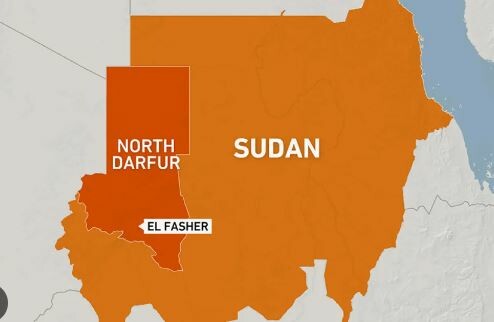The UN Office for the Coordination of Humanitarian Affairs (OCHA) on Friday said the humanitarian situation for an estimated 800,000 civilians in Al Fasher in northern Darfur and surrounding areas has deteriorated following the outbreak of armed clashes between the Sudanese Armed Forces (SAF) and the Rapid Support Forces (RSF) since 10 May 2024.
According to a flash update from the UN agency, a rapidly deteriorating humanitarian situation and increasing protection concerns have been observed since then, with an increased frequency of armed clashes affecting parts of the city that had been relatively free of direct conflict impacts until now.
Ongoing fighting in the northern and eastern parts of Al Fasher, together with attacks on villages to the west of the city, have pushed civilians towards the city where they now reportedly shelter in extremely overcrowded gathering sites throughout the southern neighborhoods of the town,” the update stated. “Since 20 May, at least 1,250 people (250 households) have been displaced from the Gashlack police station, Al Gadi, and Azama neighborhoods in Al Fasher town to other locations within Al Fasher locality, according to IOM. The situation on the ground reportedly remains tense and unpredictable. At least 700 injured civilians arrived at the Al Fasher South Hospital, of whom 85 have died, MSF has reported.”
“Due to the intensity of the fighting and lack of safe passage for civilians, it is anticipated that the number of reported casualties will rise.” It added.
OCHA also said that medical supplies at the South Hospital are running out, with only around 10 days of supplies left and there is an urgent need to restock the hospital once safe access and authorizations permit supply vehicles to reach the area.
“Even before the latest escalation, the conditions in IDP gathering sites in Al Fasher indicated severe deprivation with insufficient shelter and hygiene infrastructure and supplies, and significant shortfalls in humanitarian services and assistance due to access constraints. The expansion of the clashes towards south-eastern neighborhoods as well as some direct shelling of the western and central parts of the town indicate a significant broadening of the direct impacts of the conflict on the civilian population remaining in the city,” the statement read in part. “As indiscriminate bombing encroaches on different neighborhoods of the city, the increased use of civilian infrastructure and objects for military purposes by parties to the conflict and the increased presence of armed elements throughout the town exacerbates protection risks faced by civilians.”
Conversely, humanitarian partners have received reports that indicate that basic necessities, including water, are out of reach for a growing proportion of the civilian population due to the ongoing fighting. Key roads out of Al Fasher are either blocked, subject to significant barriers to movement, or unsafe due to the presence and activities of parties to the conflict and armed groups.
“The outbreak of fighting and insecurity adds to long-running access constraints due to disruptions in crossline and cross-border humanitarian movements. So far in 2024, only 39 trucks reached Al Fasher via crossline and cross-border,” the update stated. “The trucks transported health, nutrition, and food supplies for an estimated 186,000 people. Some 1,500 MT of non-food items (NFIs) at the Tine crossing point have been waiting for approval for onward movement for three weeks, depriving more than 94,000 people of assistance. In addition, the 13 trucks carrying health, nutrition and NFI supplies for over 121,000 people dispatched from Port Sudan on 3 April are still en route to Al Fasher due to delays in getting clearances at checkpoints, and more recently insecurity.”
In a statement, the UN Secretary-General reminded all parties of their obligation under international humanitarian law to protect civilians and called on them to allow the civilian population to move to safer areas. He also requested that all parties facilitate safe, rapid, and unimpeded humanitarian access to all civilians in need in Al Fasher, across Darfur, and Sudan.




